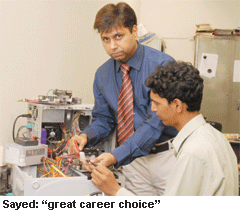The Indian IT hardware industry is booming and projected to hit an aggregate revenue of $62 billion (Rs.287,700 crore) next year — 12 times its existing revenue, says a MAIT-Ernst & Young study
An industry which is open to everybody — secondary and higher secondary school leavers, diploma holders and graduates — is computer hardware manufacturing and marketing. And the good news is that the Indian IT hardware industry is booming and projected to hit aggregate revenue of $62 billion (Rs.287,709 crore) next year — twelve times the existing revenue, according to a recent MAIT-Ernst & Young study which predicts that the industry will generate direct employment for 2.5 million citizens.
With the Central government also boosting the sector, the Indian IT hardware industry is poised to become globally competitive and export-oriented, with export earnings estimated at $25 billion (Rs.116,012 crore) by 2010. Moreover with MNCs like Intel and Samsung setting up manufacturing units in India, the demand for IT hardware professionals is set to rise exponentially.
Hardware professionals are involved with designing and developing computers, chip and circuit board design, concept-ualising hardware architecture, peripheral development and integration, testing hardware compatibility with software and providing marketing and maintenance services. They also need to supervise, inspect and provide support during manufacture, installation and implementation of hardware. Assessing and producing documents, and leading and coordinating teams during development projects are among the other duties of hardware professionals at supervisory levels.
Although a Plus Two certification in science is the minimum qualification of IT hardware companies, this is a career path open to undergraduates, graduates in any discipline and even school dropouts. A degree in computer engineering, electronics and telecomm-unications, however, offers entry into senior positions in firms and companies. Hardware study programmes are offered by colleges, universities and numerous private training institutes, such as Jetking, Aptech, CMS, M.H. Saboo Siddik Polytechnic, IIHT, M.S. Computer Academy and ReInet. These profess-ional training courses are normally of six-12 months duration. Skilling of hardware industry professionals is usually accompanied by training in networking. Internationally accepted certification programmes including A+, MCSA, MCSE, CCNA, CCNP, etc are offered by most reputed training institutes.
Hardware specialists are required by all organisations using computers. While most trained professionals prefer to work with major IT hardware industry leaders such as IBM, Hewlett-Packard, Microsoft, Sun, Reliance etc, jobs are aplenty even in smaller companies and consultancy firms developing custo-mised hardware. Teaching in technical institutions is also a good option. Pay scales tend to be good, with even Plus Two school leavers chalking up over Rs.2 lakh per month after clearing international courses like the Cisco-certified CCIE.
 “In today’s hi-tech landscape, there’s no shortage of blue-collar and white- collar jobs in India and abroad in the IT hardware industry. However it is important to choose an aptitudinally suitable training programme. Besides learning networking, the curriculum should be designed in accordance with the requirements of internationally accepted certifications,” warns Sabir Sayed, a seasoned hardware professional who’s risen from the ranks to the position of director of Anjuman-I-Islam Computer Centres, Mumbai (under the extension programme of M.H. Saboo Siddik Poly-technic) and is the director of Techno Solutions and NexGen Marketing.
“In today’s hi-tech landscape, there’s no shortage of blue-collar and white- collar jobs in India and abroad in the IT hardware industry. However it is important to choose an aptitudinally suitable training programme. Besides learning networking, the curriculum should be designed in accordance with the requirements of internationally accepted certifications,” warns Sabir Sayed, a seasoned hardware professional who’s risen from the ranks to the position of director of Anjuman-I-Islam Computer Centres, Mumbai (under the extension programme of M.H. Saboo Siddik Poly-technic) and is the director of Techno Solutions and NexGen Marketing.
An alumnus of the Diamond Jubilee High School, Mumbai, Sayed strayed into computer education on the advice of his career counsellor. He signed up for the three-year computer engin-eering diploma programme of the Maharashtra Board of Technical Education through the Saboo Siddik Polytechnic while work-ing in a computer company (Add-on Computers), where he acquired basic expertise and earned enough to pay the tuition of his study programme.
A workaholic, sayed keeps five organisations running to the midnight hour every day. “At Hazrat Bibi Computer Education Institute where I’ve been a director since 2008, apart from the diploma course in com-puter hardware and networking, we conduct BCA, B.Sc and M.Sc IT exams. My own company, NexGen Marketing, which I promoted in Mumbai in 1994 is into computer maintenance, sales and IT consultancy, with 200 clients and a headcount of 95,” says Sayed.
The author of several books and study papers on the computer hardware industry, Sayed expresses considerable satisfaction with his chosen career path in this industry. “I can say it’s a great career choice since it’s open to everybody, even those who can’t make it into full-fledged engineering degree programmes. However, this is a profession which requires continuous education, and IT hardware profess-ionals have to constantly upgrade their skills to get to the top. It’s not for slack-ers and the faint-hearted,” he advises.
Indra Gidwani (Mumbai)